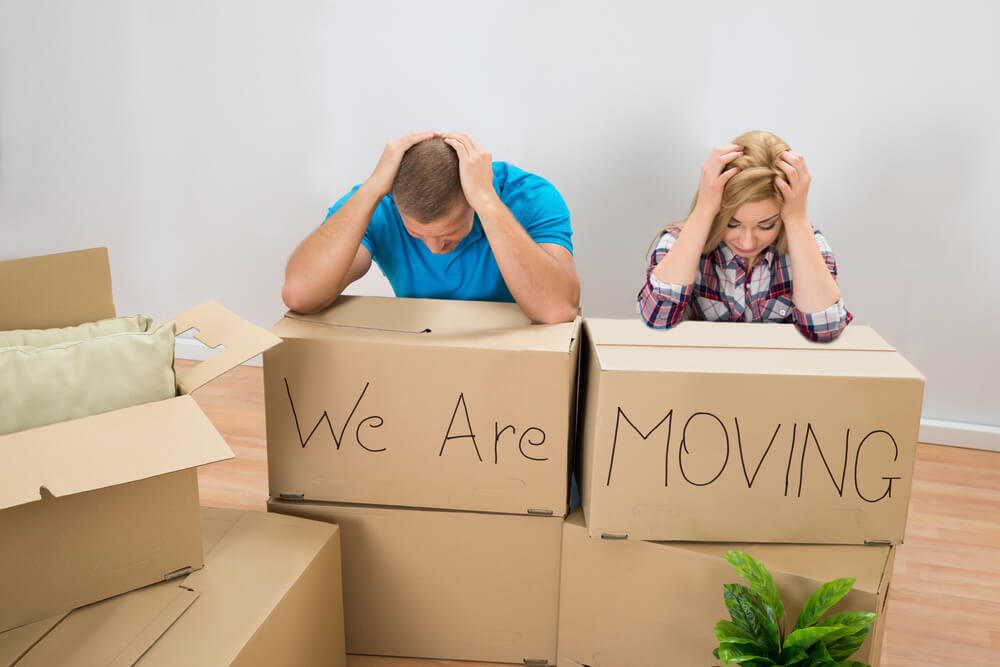Do I have to move on my own? Are there any relocation specialists available? Are movers essential workers? Is it safe to move at all? These are strange times we live in, so we don’t blame you if you have all these questions and no idea how to answer them. Our routines have changed entirely due to the global pandemic, and planning a life-changing event such as relocating might appear quite scary. But that’s where we come in, with a handful of tips to calm you down and help you understand how the relocation process works during the coronavirus outbreak.

Is It Possible to Move During COVID-19?
With lots of misinformation going around due to the global coronavirus outbreak, it’s no wonder if you find yourself confused or utterly frightened amid the relocation process, not knowing if you should follow through with your plans or stay hidden behind closed doors. However, with all the relocation tips and guidelines we now have from the World Health Organization, there are ways to move your home and stay safe at the same time.
Although there are things outside of your control at the moment, relocating efficiently doesn’t have to be one of them. Whatever your reasons to move during COVID-19 crises are, with the right long-distance moving company by your side, scheduling and executing a full-service move won’t be such a tall task. Whether your relocation is local or a long-distance one, with all the moving services they provide and their new approach to safety, you have no reason to worry.

Why Are Moving Services Essential?
It’s important to understand that, right now, all businesses are divided into two categories – essential and non-essential. There are regulations for individuals during the pandemic, which allow them to interact and move in certain ways, and there are also rules for all the legal entities. The ones necessary – like healthcare services, grocery stores, moving companies, transportation, education, financial services, etc., which serve the society as a support system, are considered essential businesses. The rest, whose primary purpose is entertainment – bars and restaurants, shopping malls, theaters, museums, are considered non-essential. In short, the answer to the question Is moving essential – is yes.
If you’re wondering why movers are considered essential services, the answer is quite simple. Usually, people don’t have an alternative plan when starting anew due to various life-changing circumstances. They might have sold their old home or purchased a new one, which doesn’t make the relocating date flexible. The relocation stress they go through is pretty overwhelming even without the global panic surrounding them. Regardless of the reason why relocating to a new home is inevitable at a given point, moving is considered that critical because usually, people simply have to proceed with their plans.
Are Moving Companies Open?
Even though the pandemic has greatly affected the moving industry and how companies operate, they are certainly not closed. Some of them might have been shut down, but the majority is still safe and sound, with all their employees and teams fully operational. Sure, this is not the time when all companies can guarantee the same range of services; some will offer you the cheapest way to ship a car or maybe the best storage service, while others may not be able to perform their usual services regularly. And if you’re wondering how much long-distance movers cost, keep in mind that the relocation budget you have to set aside will also depend on the variety of services required. Whatever the case is, contact the professionals you’re interested in to ensure they can provide you with everything you need.
What Precautions Do Companies Take to Keep Employees and Customers Safe in the Time of Coronavirus?
Adapting to keep employees and customers safe is something companies must take upon themselves to keep their business running. Given that most of them are equally busy just as before the outbreak, implementing the CDC Recommended Guidelines is only a starting point. However, additional safety precautions have to be taken to have a stress-free relocation:
- Reducing transmission by practicing social distancing,
- Cleaning and sanitizing all the equipment and trucks as often as possible,
- Providing virtual estimates instead of in-home ones,
- Enabling contactless card payments,
- Wearing masks and gloves all the time.
Pay Attention to Regulations Because They Change Quite Often
Although COVID-19 has affected the whole country, each state has taken different measures to reduce the spread, including business restrictions. Don’t be surprised if the businesses opened in one corner of the country are at the same time closed in another one. At the moment, even non-essential businesses are allowed to remain open in some areas, so be sure to inform yourself in detail before deciding to move to the new state you’ve been dreaming of or moving to a small town you know nothing about. Do yourself a favor and keep up to date with pandemic restrictions.

Tips to Mitigate the Risk of Coronavirus While Relocating
If you’d like to avoid anxiety about moving out, don’t make one of the biggest relocation mistakes and ignore the protocols designed to help you during the outbreak. Whether you’re trying to figure out all the relocation hacks in order to protect items in storage units properly or to move a garage and clean the items accurately, take these tips as stress-relieving activities:
- Be transparent – If someone in your family is experiencing symptoms similar to coronavirus or has received a positive test result, it’s crucial to let the company know right away. Protecting their employees on time is the only way to keep everyone safe.
- Obtain hygiene products – Even though relocation specialists usually have those stacked on hand, it’s important to have basic hygiene supplies prepared at home, as well. With all the heavy lifting included – from shifting furniture down to packing electronics and transporting the belongings to and from the house, soap and sanitizer are the least they need.
- Purchase new supplies – Although we always encourage reusing moving materials, this is not the best time to ask yourself where to get free boxes or any other packing materials you might need. As far as we know, this virus survives on the cardboard surface long enough (one day) to increase the risk of transmission.
Being Prepared for the Movers Is Essential (No Pun Intended)
Knowing how to prepare for movers is undoubtedly one of the most important measures against coronavirus when transitioning from one place to another. To make everything a bit simpler, don’t wait until the last minute to prepare, but organize ahead of time. Depending on the size of the move and people included, think of all the things you might need to make your relocation go without a hitch.
With a thorough to-do list by your side and an expenses checklist thought out, you’ll be able to purchase items required in one go. Also, this is a perfect moment to remind you to finish your packing one day before relocation specialists arrive. With all the packing tips available, you’ll quickly learn how to manage all the delicate stuff, even if you’re not a pro. One of the common things people forget is purging their homes and getting rid of the items movers won’t move. If there’s not enough time to figure out creative storage ideas for your new place, donate furniture you don’t need, as well as all other items you find unnecessary.
Last but not least, remember to sanitize all your belongings as you pack by simply wiping them down with disinfectants because everyone’s health matters.
Make Sure You Check Out the Company’s COVID-19 Policy
Employee and customer safety should always be a company’s top priority, so their response to the epidemic is critical for both parties. Nonetheless, they have every right to set their operating practices, regardless of how the others are doing it. This is why you should contact your relocation representative if you’re not sure about the protocols put into place. Usually, you can easily find the COVID-19 policy on the company’s website. However, sometimes it’s better to contact them directly so they can walk you through the whole process.
For all the basic anti-coronavirus tips in one place, check out the video below.
Keep These in Mind if You’re Not Feeling Well
Needless to say, contact a doctor immediately and notify your relocation representative right after if you’re not feeling well. If the company doesn’t have all the information required to take extra precautions, you’re putting its workforce at risk. Being honest doesn’t automatically mean professionals will refuse to help you, especially if you receive negative test results. On the contrary, when all the mitigating factors are met, the relocation process is still doable. Do not remove your mask and gloves while packing and disinfect all the items that you won’t be handling yourself. Also, you have to keep a safe distance and stay at least 6 feet away from relocation specialists during the relocation day.
Canceling the Move
If you’re not feeling well and you belong to a high-risk group, maybe it’s time to consider canceling the move. The same goes for individuals over 60, with more delicate health conditions, because nothing is worth risking your own or someone else’s life.
In case you decide to do so, contact your relocation representative directly. Since most of the contracts are non-binding, if you notify your company on time, you’ll probably be able to cancel the move without any financial penalties. However, if you provided a deposit, carefully go through your contract and see whether it will be returned to you. The pandemic circumstances are unique, and even if your deposit was non-refundable, there’s still a chance you’ll get your money back.
DIY Moving
Depending on the circumstances, you might get into a situation where it may be necessary to relocate without hiring professional help. If so, try to stay calm because nothing much has changed concerning DIY moves. Sure, your family and friends might not be there to help you move the refrigerator, and there won’t be the going-away party you wanted so much. However, don’t forget you can always video call people you love and have a good time with them, maybe even get some tips for relocating out of state.
Even if you’re doing it yourself, have some soap, hand sanitizer, surface disinfectant, and paper towels at all times. Think of a detailed plan to safely relocate into your new house to minimize any potential risk.

Now You Know Why Movers Are Essential Workers, for Better or for Worse, in Sickness and in Health
So, is moving considered essential? Well, you all probably know what it looks like when you do it on your own. And you most probably know how indispensable their work really is, with or without a crisis. Yet again, keep in mind that the entire industry is giving its best to protect the customers, but it’s still crucial for you to follow the rules. They are at your service, for sure, but it’s a pact of joint responsibility.





